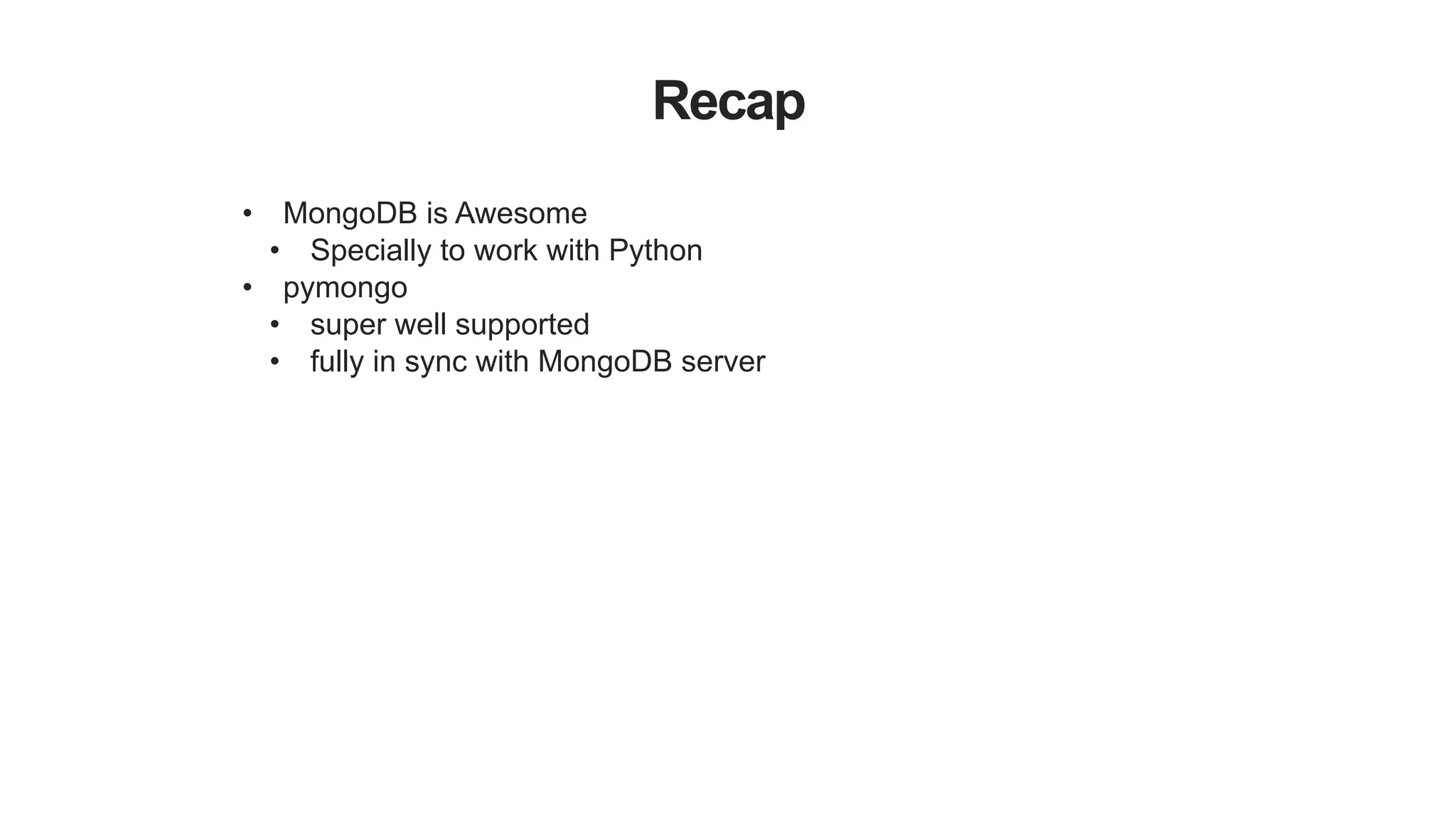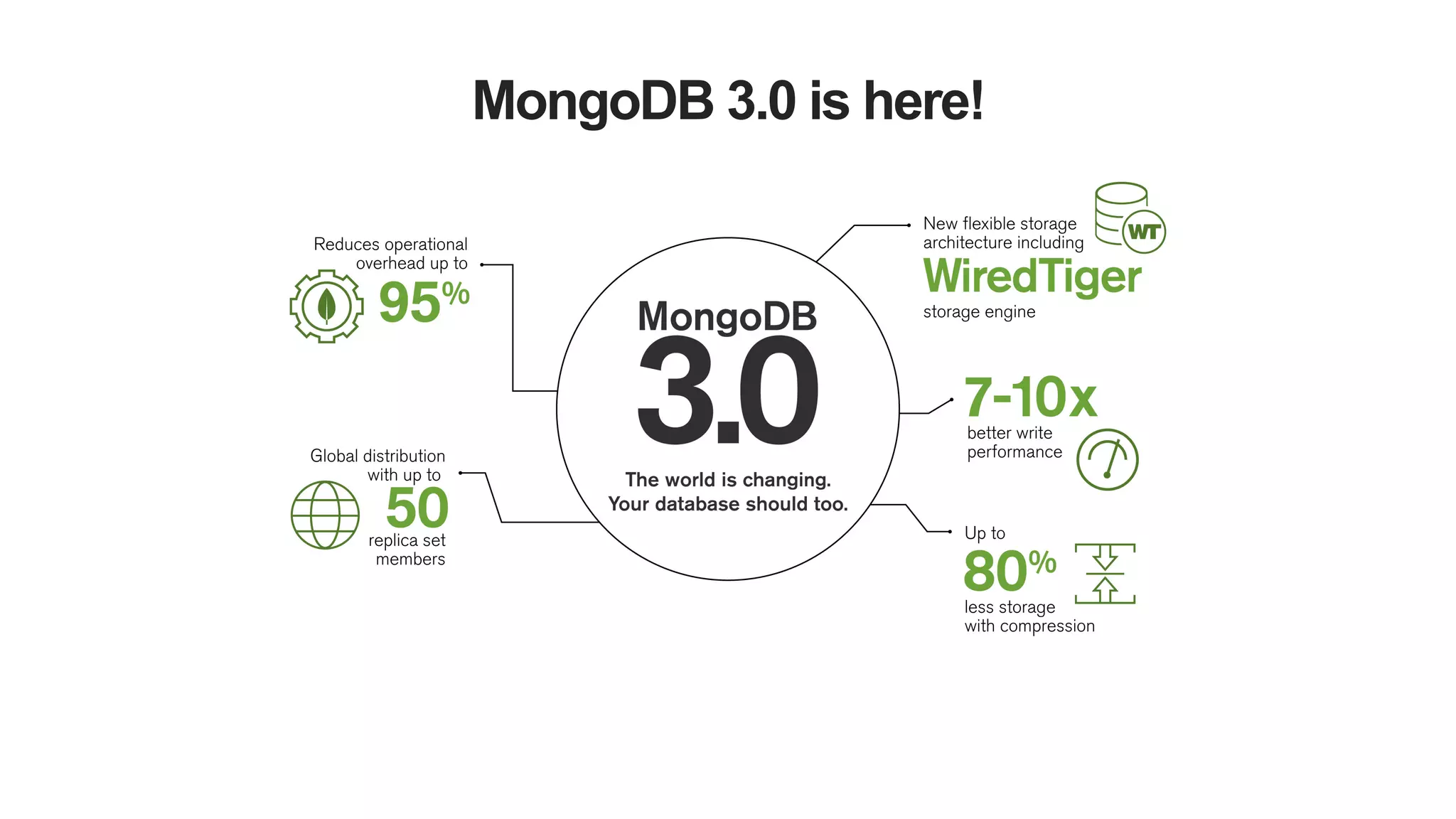This document provides an overview of using MongoDB with Python. It introduces pymongo, the official Python driver for MongoDB, and covers connecting to MongoDB, performing CRUD operations, aggregation, GridFS for large files, indexing, and ODM frameworks. The presenter is Norberto Leite, a MongoDB Technical Evangelist based in Madrid, Spain.


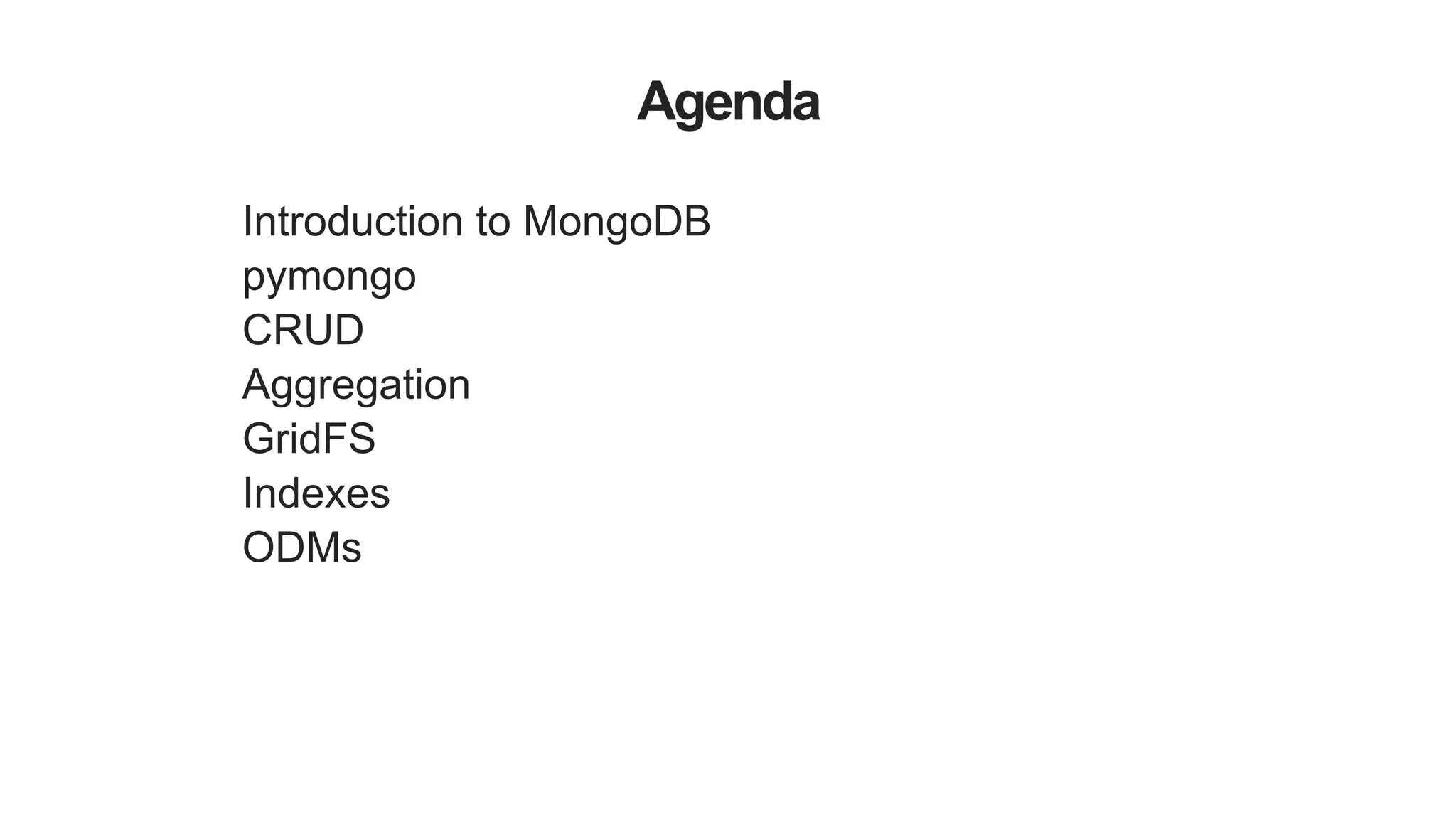



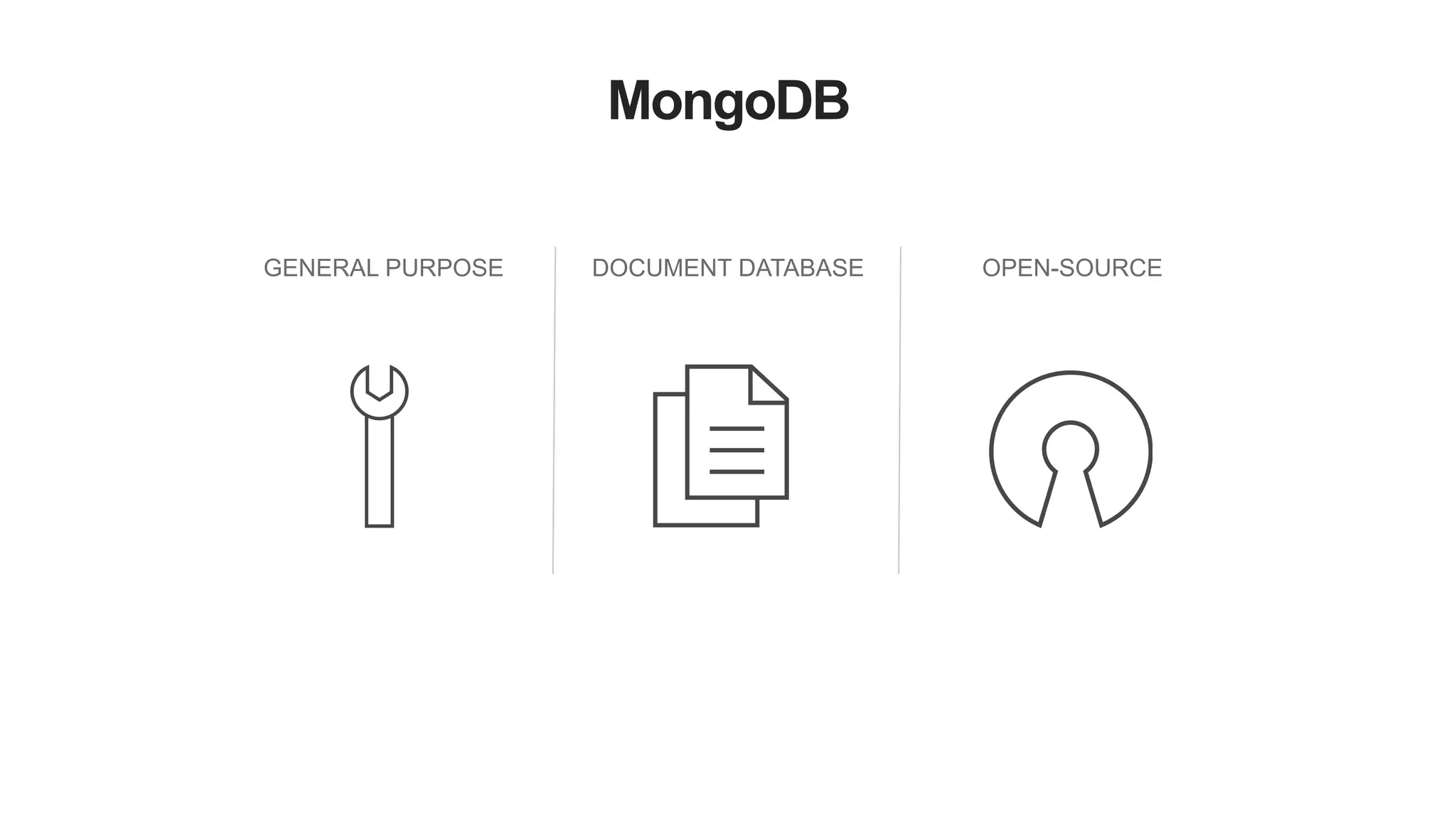

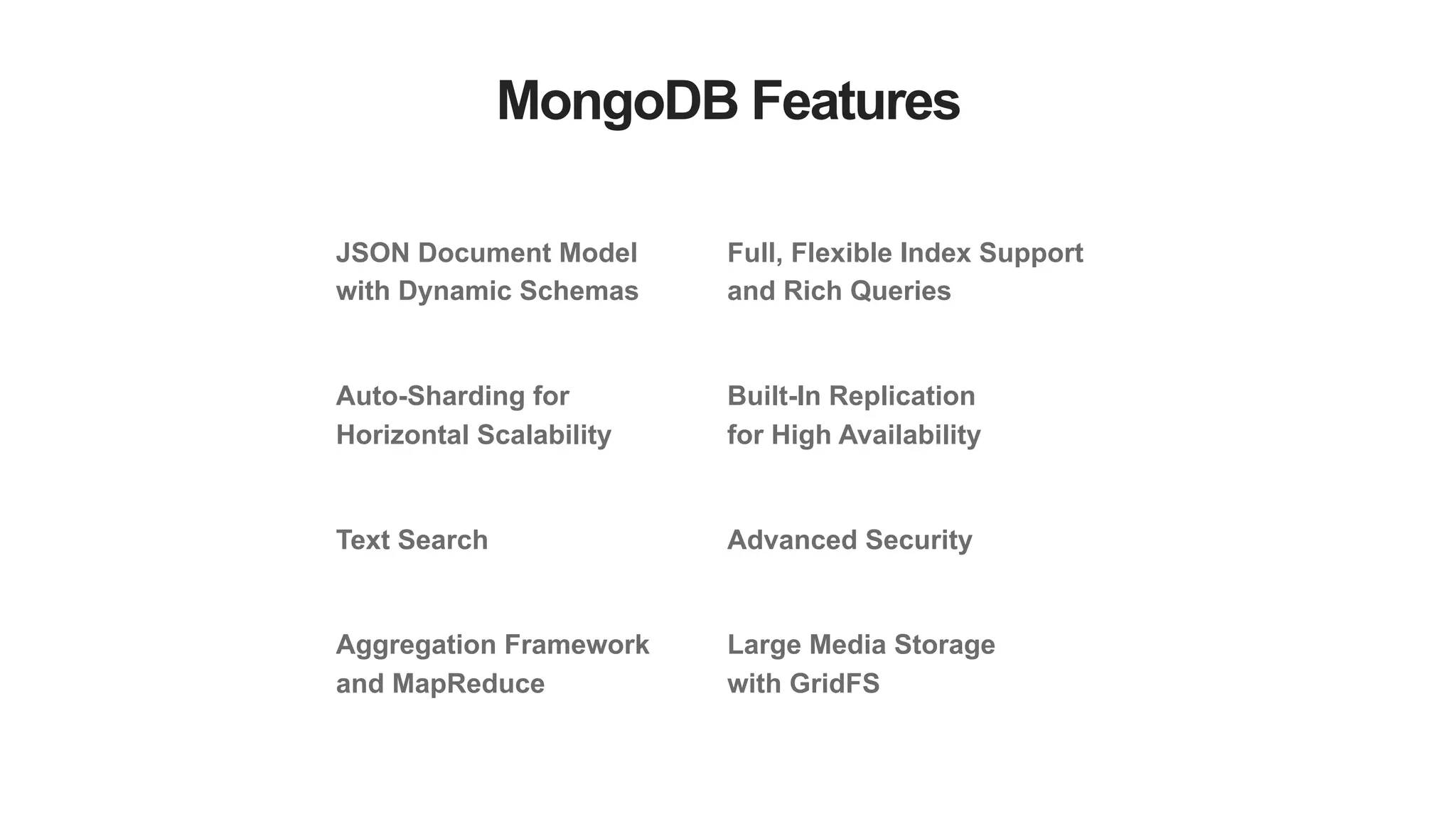
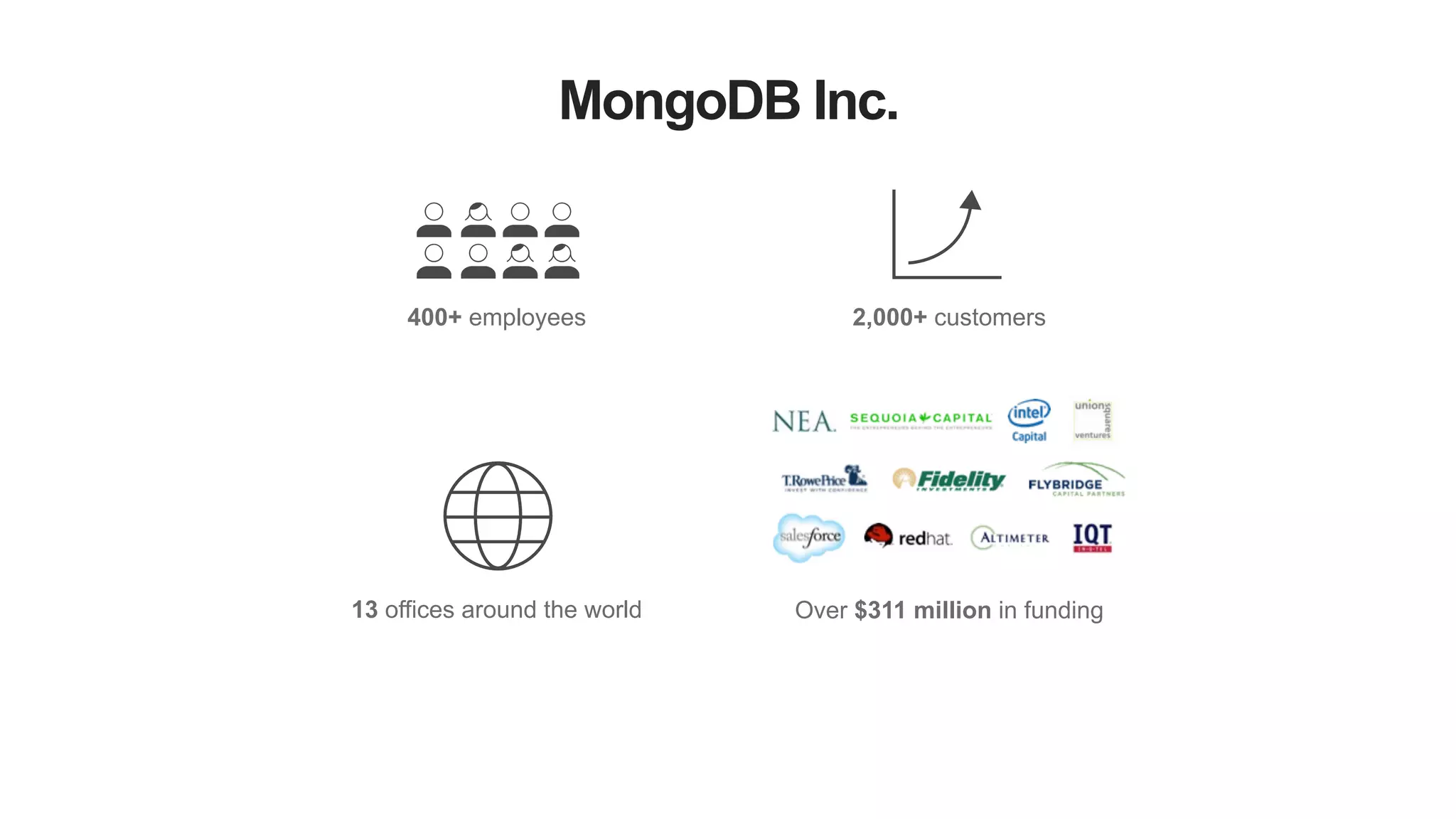



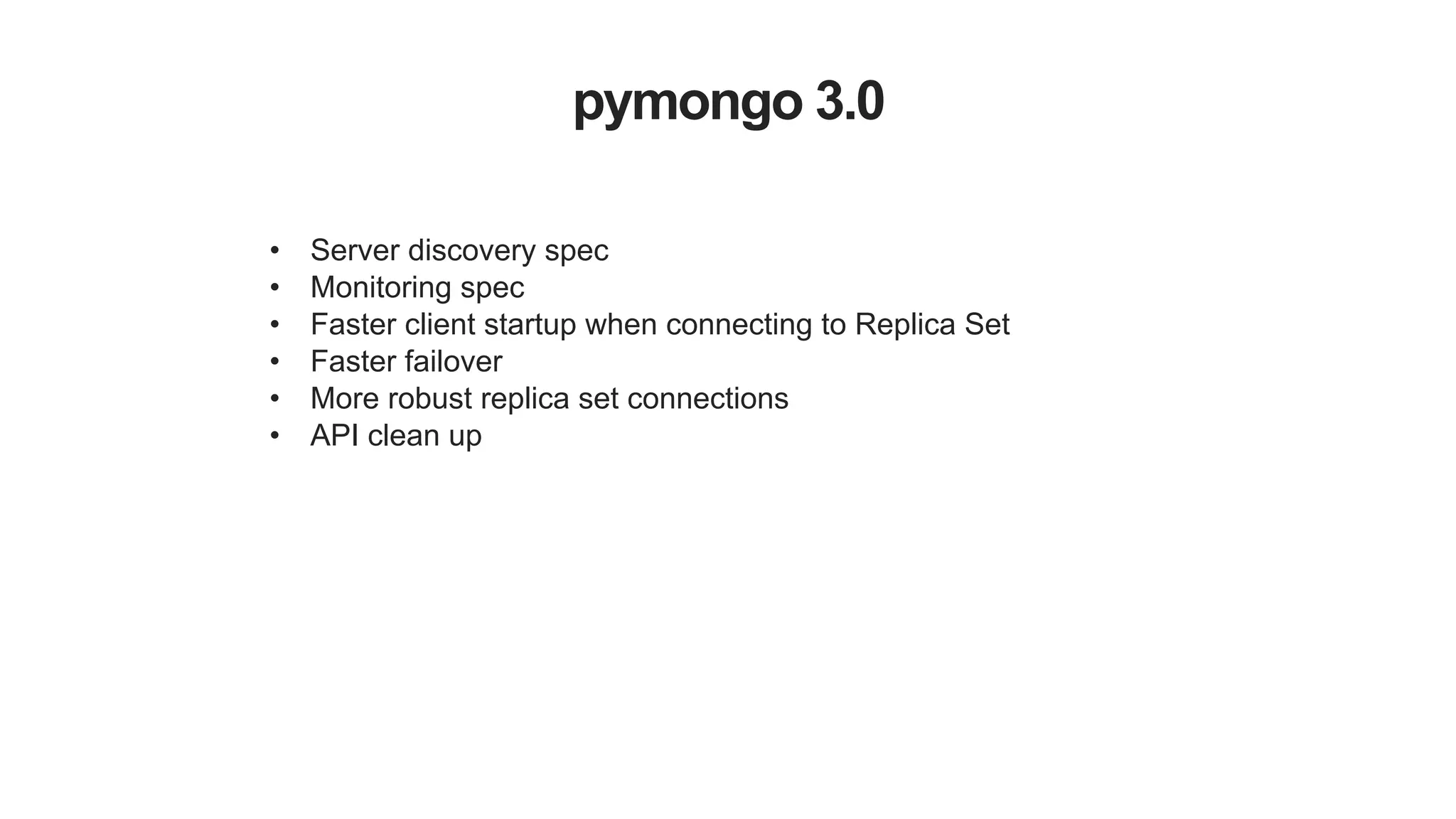

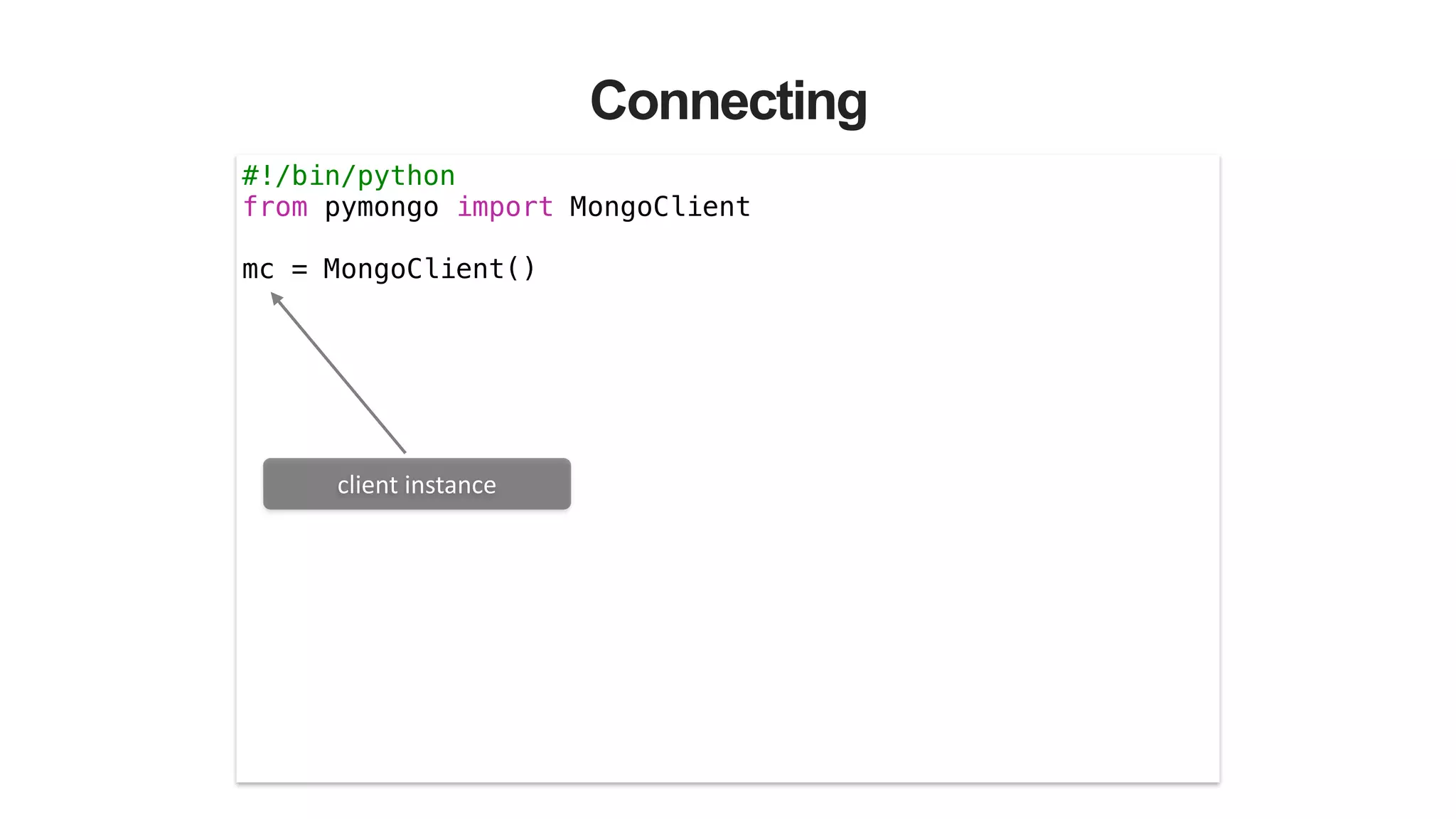
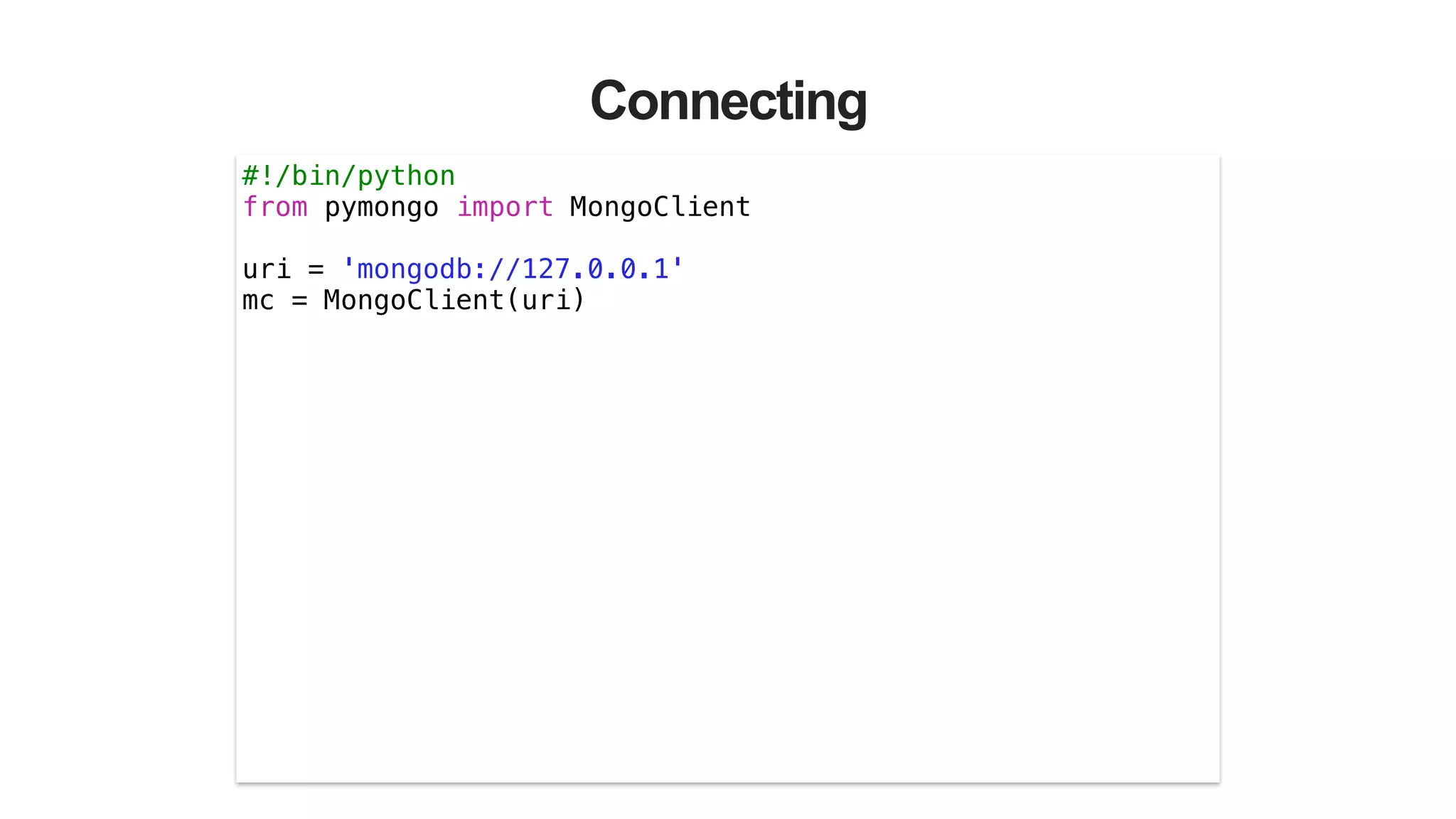
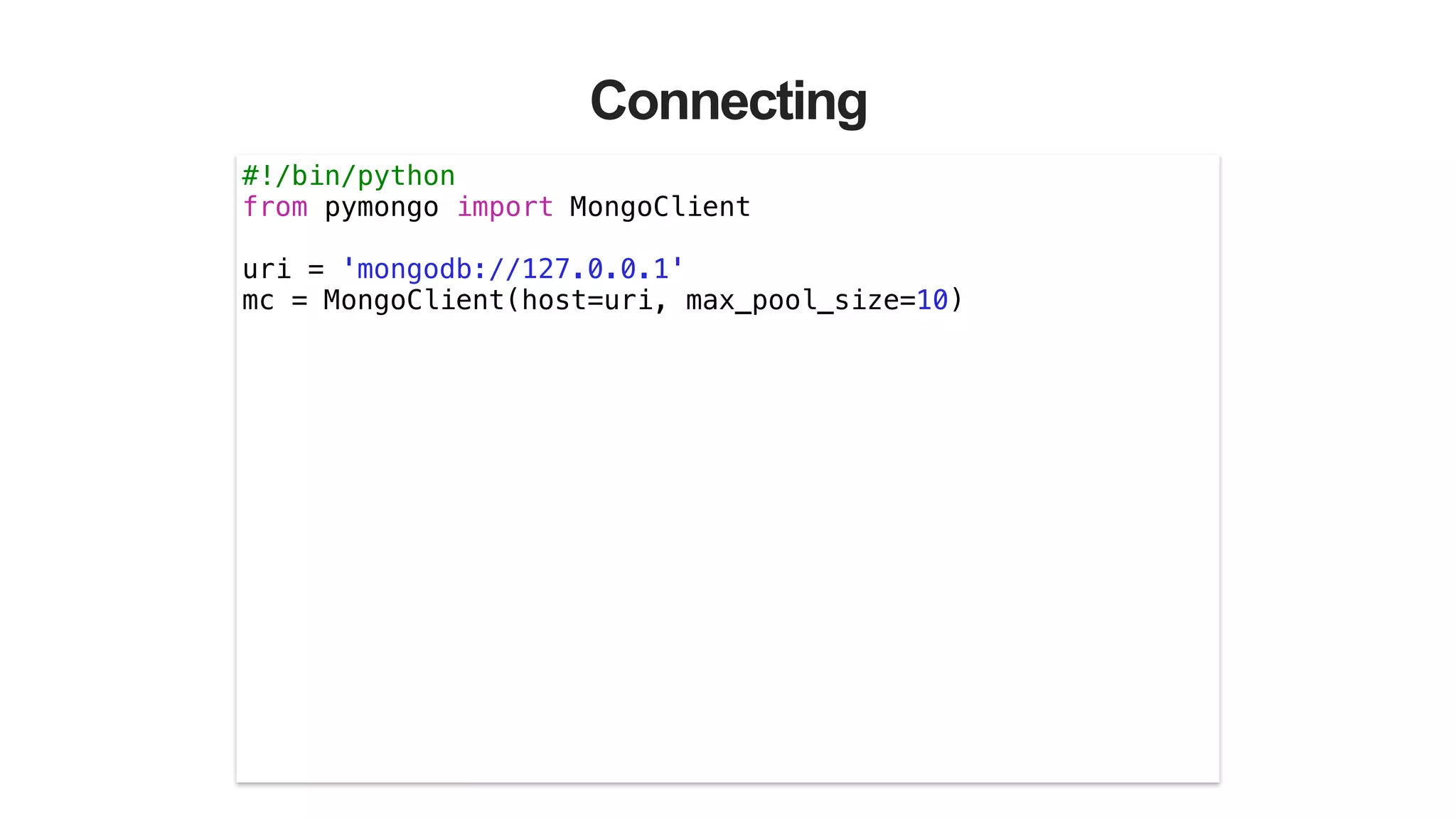
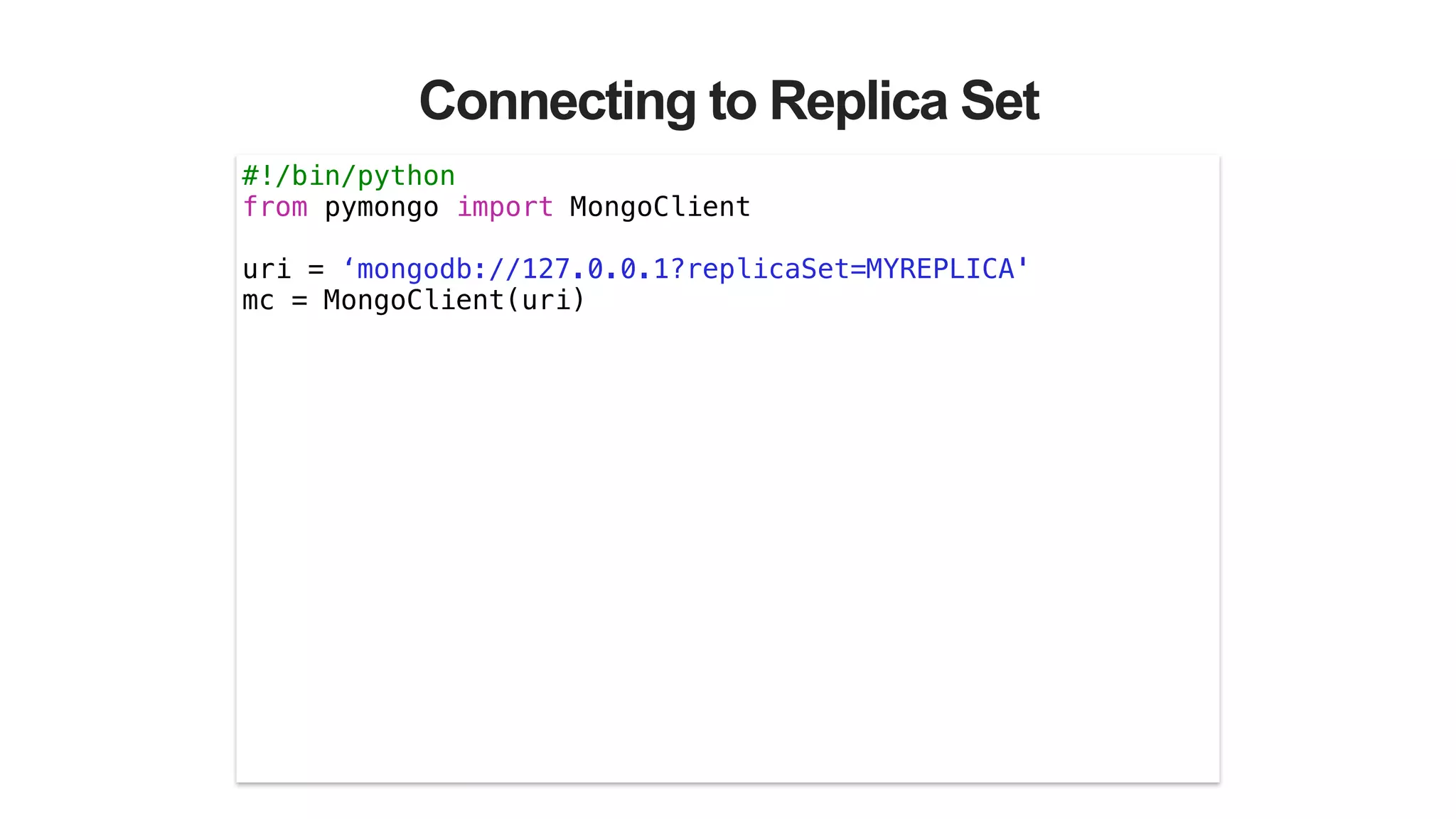
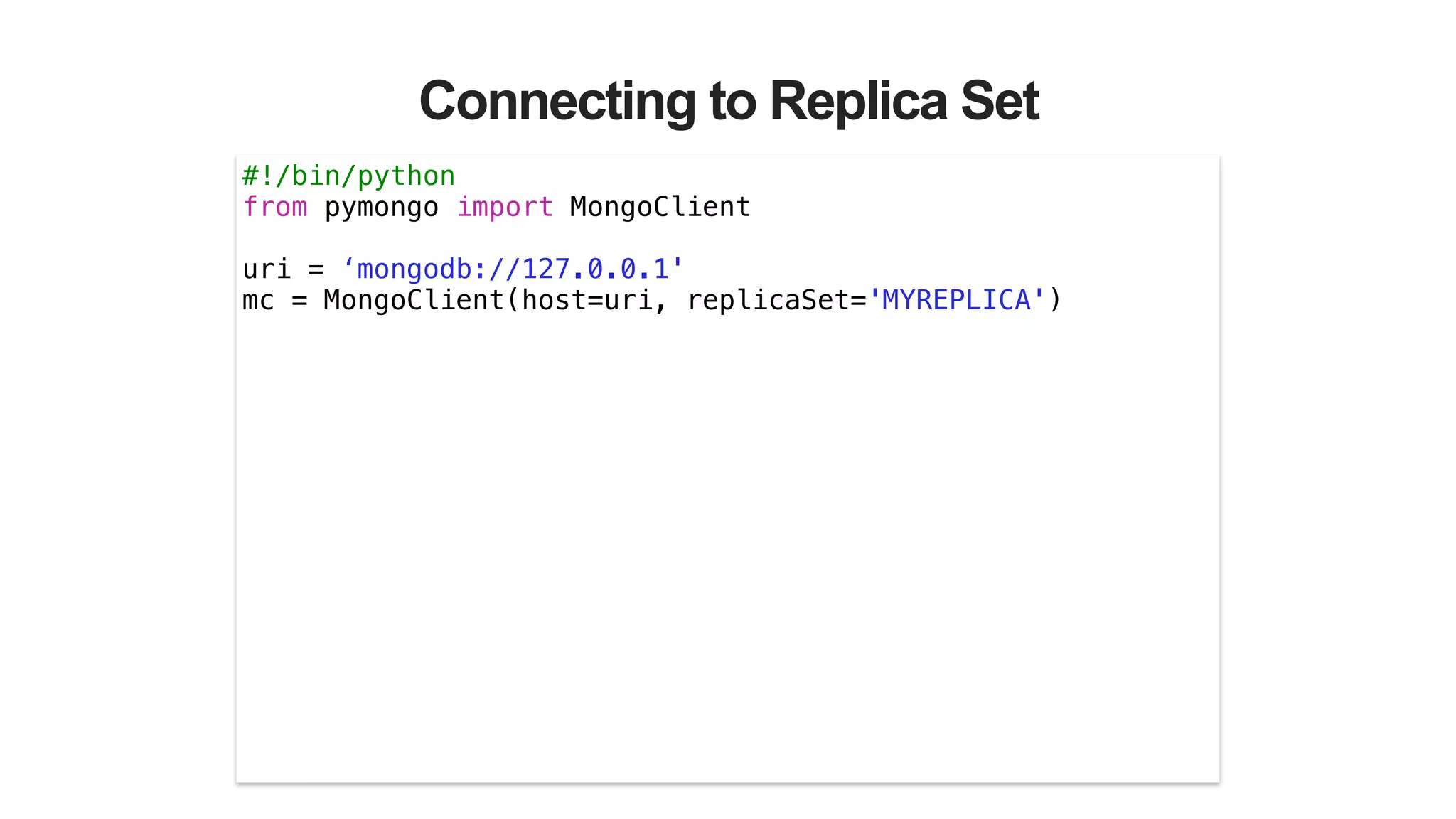
![Database Instance
#!/bin/python
from pymongo import MongoClient
mc = MongoClient()
!
db = mc['madrid_pug']
!
#or
!
db = mc.madrid_pug
database
instance](https://image.slidesharecdn.com/madridpug-150709181856-lva1-app6892/75/Python-and-MongoDB-21-2048.jpg)
![Collection Instance
#!/bin/python
from pymongo import MongoClient
mc = MongoClient()
!
coll = mc[‘madrid_pug’]['testcollection']
!
#or
!
coll = mc.madrid_pug.testcollection
collection
instance](https://image.slidesharecdn.com/madridpug-150709181856-lva1-app6892/75/Python-and-MongoDB-22-2048.jpg)

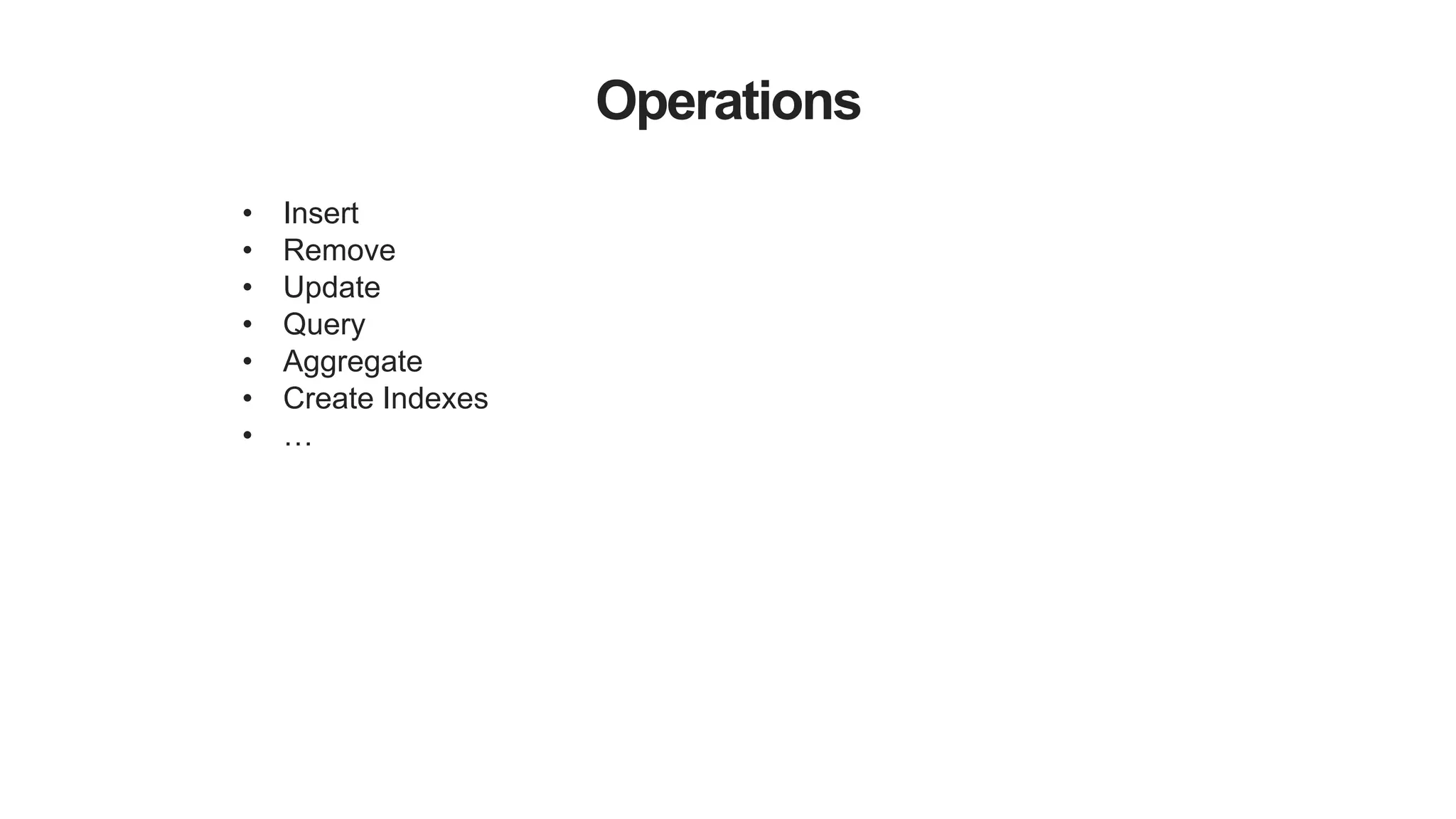

![Insert
#!/bin/python
from pymongo import MongoClient
mc = MongoClient()
!
coll = mc['madrid_pug']['testcollection']
!
!
coll.insert( {'field_one': 'some value'})](https://image.slidesharecdn.com/madridpug-150709181856-lva1-app6892/75/Python-and-MongoDB-26-2048.jpg)
![Find
#!/bin/python
from pymongo import MongoClient
mc = MongoClient()
!
coll = mc['madrid_pug']['testcollection']
!
!
cur = coll.find_one( {'field_one': 'some value'})
!
for d in cur:
print d](https://image.slidesharecdn.com/madridpug-150709181856-lva1-app6892/75/Python-and-MongoDB-27-2048.jpg)
![Update
#!/bin/python
from pymongo import MongoClient
mc = MongoClient()
!
coll = mc['madrid_pug']['testcollection']
!
!
result = coll.update_one( {'field_one': 'some value'},
{"$set": {'field_one': 'new_value'}} )
#or
!
result = coll.update_many( {'field_one': 'some value'},
{"$set": {'field_one': 'new_value'}} )
!
print(result)
!](https://image.slidesharecdn.com/madridpug-150709181856-lva1-app6892/75/Python-and-MongoDB-28-2048.jpg)
![Remove
#!/bin/python
from pymongo import MongoClient
mc = MongoClient()
!
coll = mc['madrid_pug']['testcollection']
!
!
result = coll.delete_one( {'field_one': 'some value’})
!
#or
!
result = coll.delete_many( {'field_one': 'some value'})
!
print(result)
!](https://image.slidesharecdn.com/madridpug-150709181856-lva1-app6892/75/Python-and-MongoDB-29-2048.jpg)

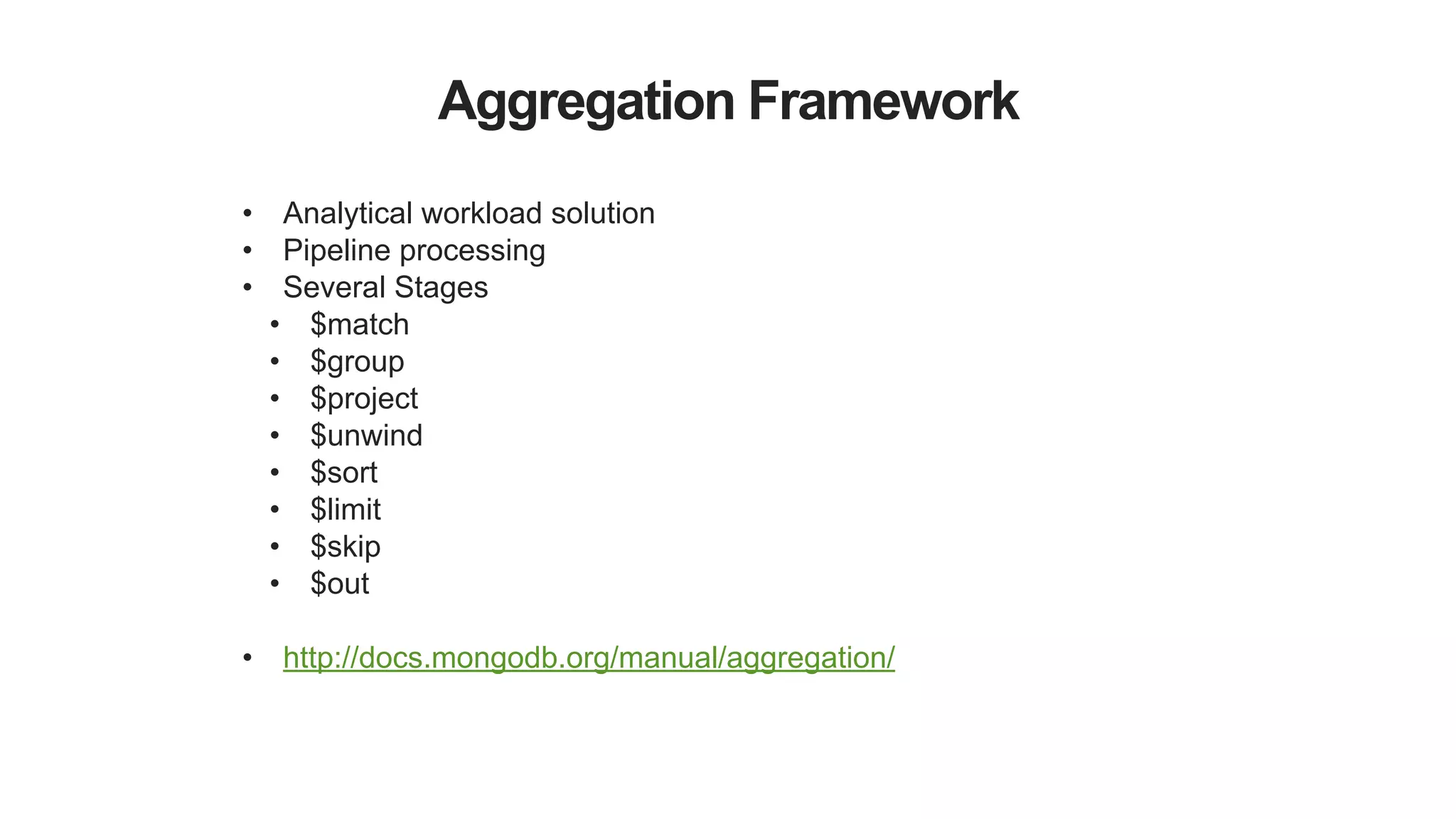
![Aggregation Framework
#!/bin/python
from pymongo import MongoClient
mc = MongoClient()
!
coll = mc['madrid_pug']['testcollection']
!
!
cur = coll.aggregate( [
{"$match": {'field_one': {"$exists": True }}} ,
{"$project": { "new_label": "$field_one" }} ]
)
!
for d in cur:
print(d)](https://image.slidesharecdn.com/madridpug-150709181856-lva1-app6892/75/Python-and-MongoDB-32-2048.jpg)

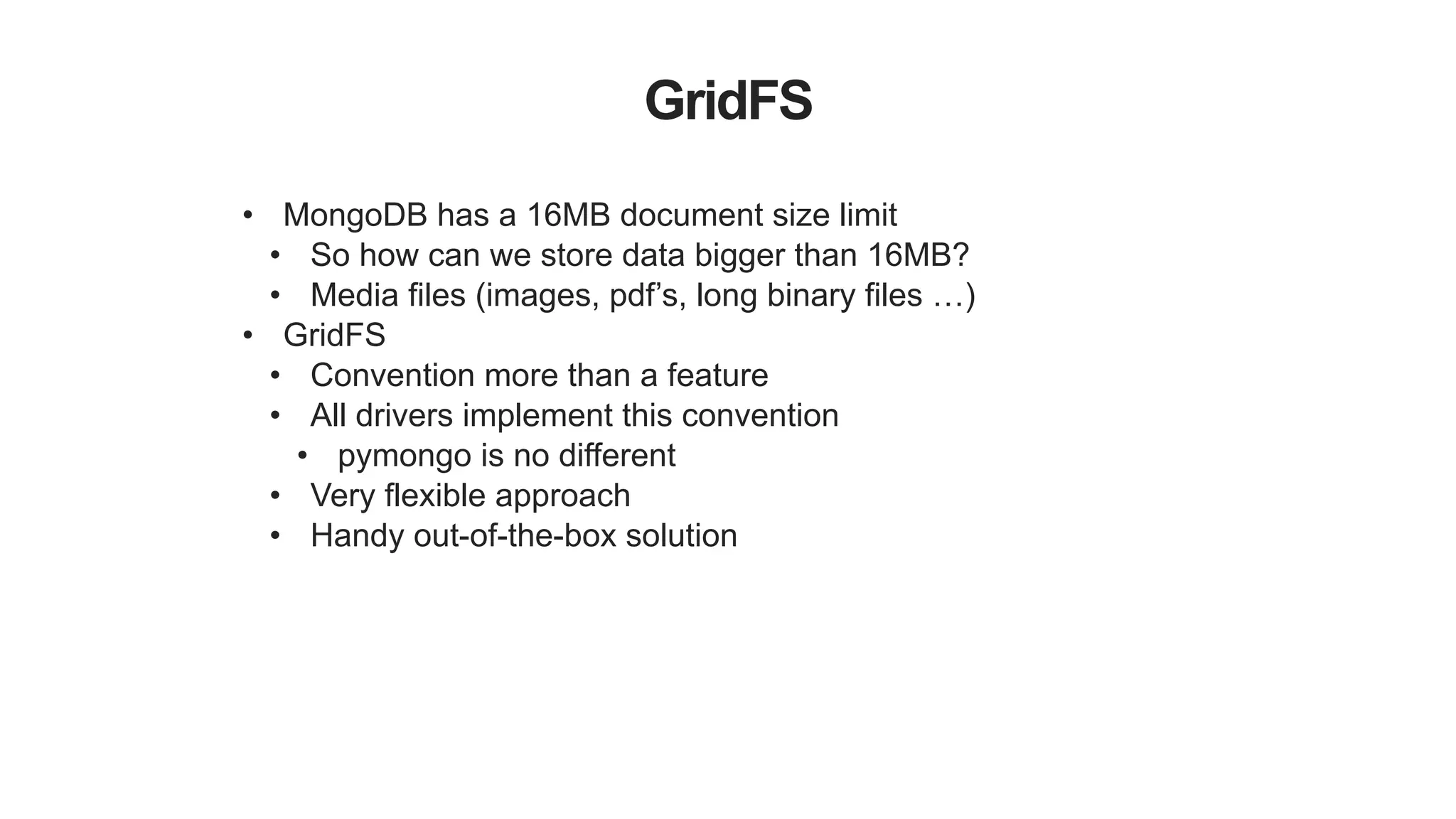
![GridFS
#!/bin/python
from
pymongo
import
MongoClient
import
gridfs
!
!
mc
=
MongoClient()
database
=
mc.grid_example
!
!
gfs
=
gridfs.GridFS(
database)
!
read_file
=
open(
'/tmp/somefile',
'r')
!
gfs.put(read_file,
author='Norberto',
tags=['awesome',
'madrid',
'pug'])
call
grids
lib
w/
database](https://image.slidesharecdn.com/madridpug-150709181856-lva1-app6892/75/Python-and-MongoDB-35-2048.jpg)
![GridFS
#!/bin/python
from
pymongo
import
MongoClient
import
gridfs
!
!
mc
=
MongoClient()
database
=
mc.grid_example
!
!
gfs
=
gridfs.GridFS(
database)
!
read_file
=
open(
'/tmp/somefile',
'r')
!
gfs.put(read_file,
author='Norberto',
tags=['awesome',
'madrid',
'pug'])
open
file
for
reading](https://image.slidesharecdn.com/madridpug-150709181856-lva1-app6892/75/Python-and-MongoDB-36-2048.jpg)
![GridFS
#!/bin/python
from
pymongo
import
MongoClient
import
gridfs
!
!
mc
=
MongoClient()
database
=
mc.grid_example
!
!
gfs
=
gridfs.GridFS(
database)
!
read_file
=
open(
'/tmp/somefile',
'r')
!
gfs.put(read_file,
author='Norberto',
tags=['awesome',
'madrid',
'pug'])
call
put
to
store
file
and
metadata](https://image.slidesharecdn.com/madridpug-150709181856-lva1-app6892/75/Python-and-MongoDB-37-2048.jpg)
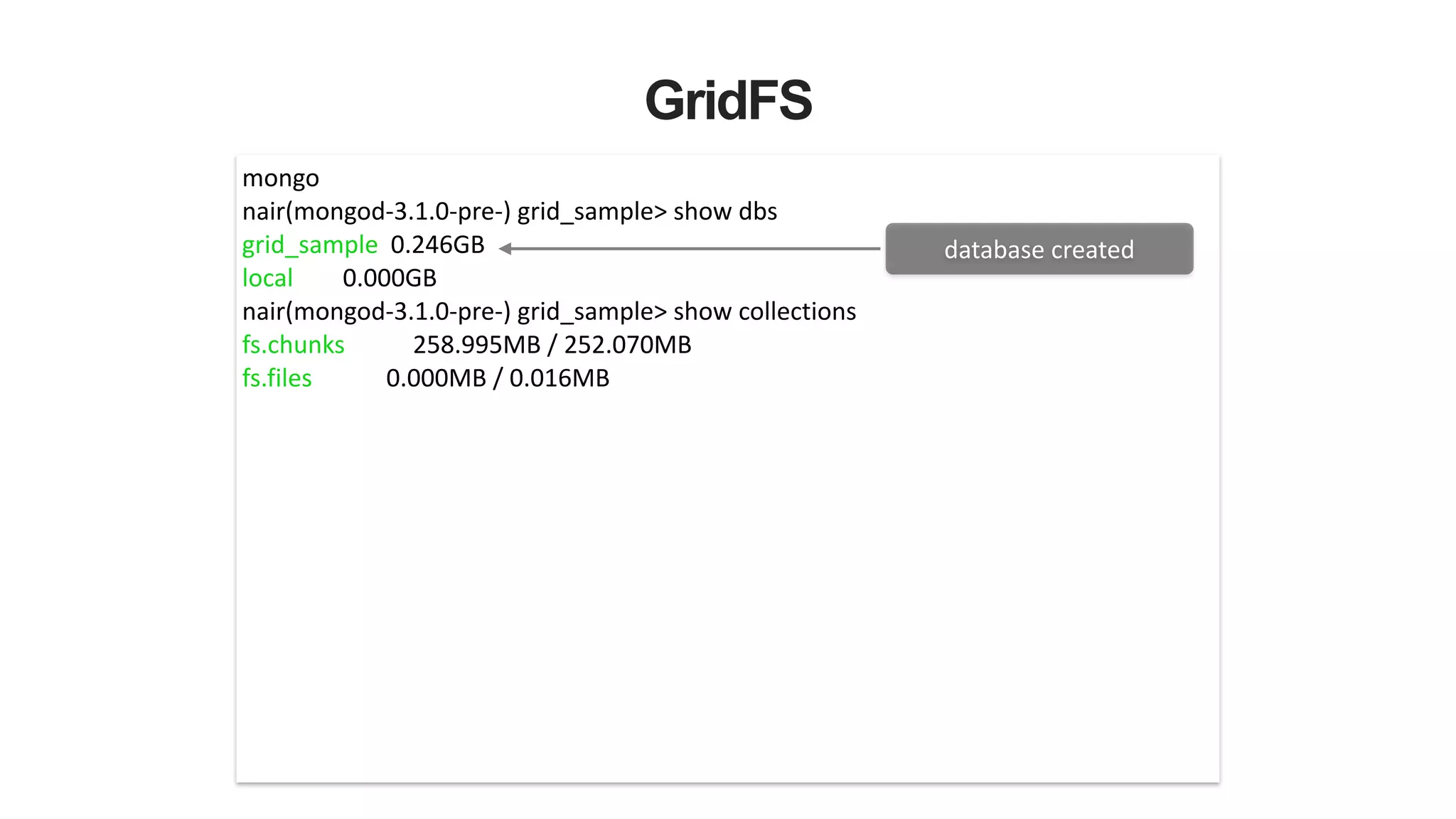
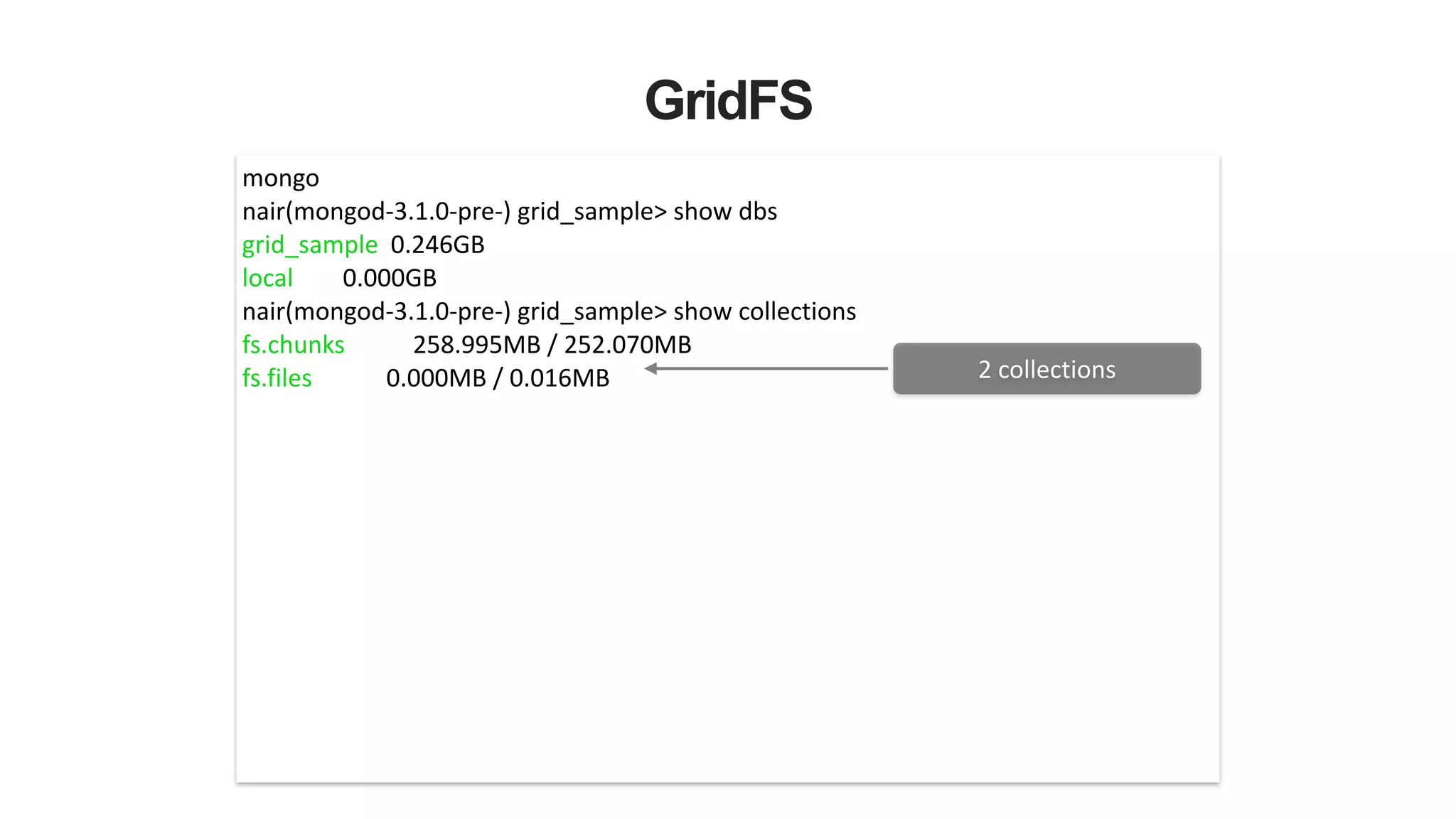
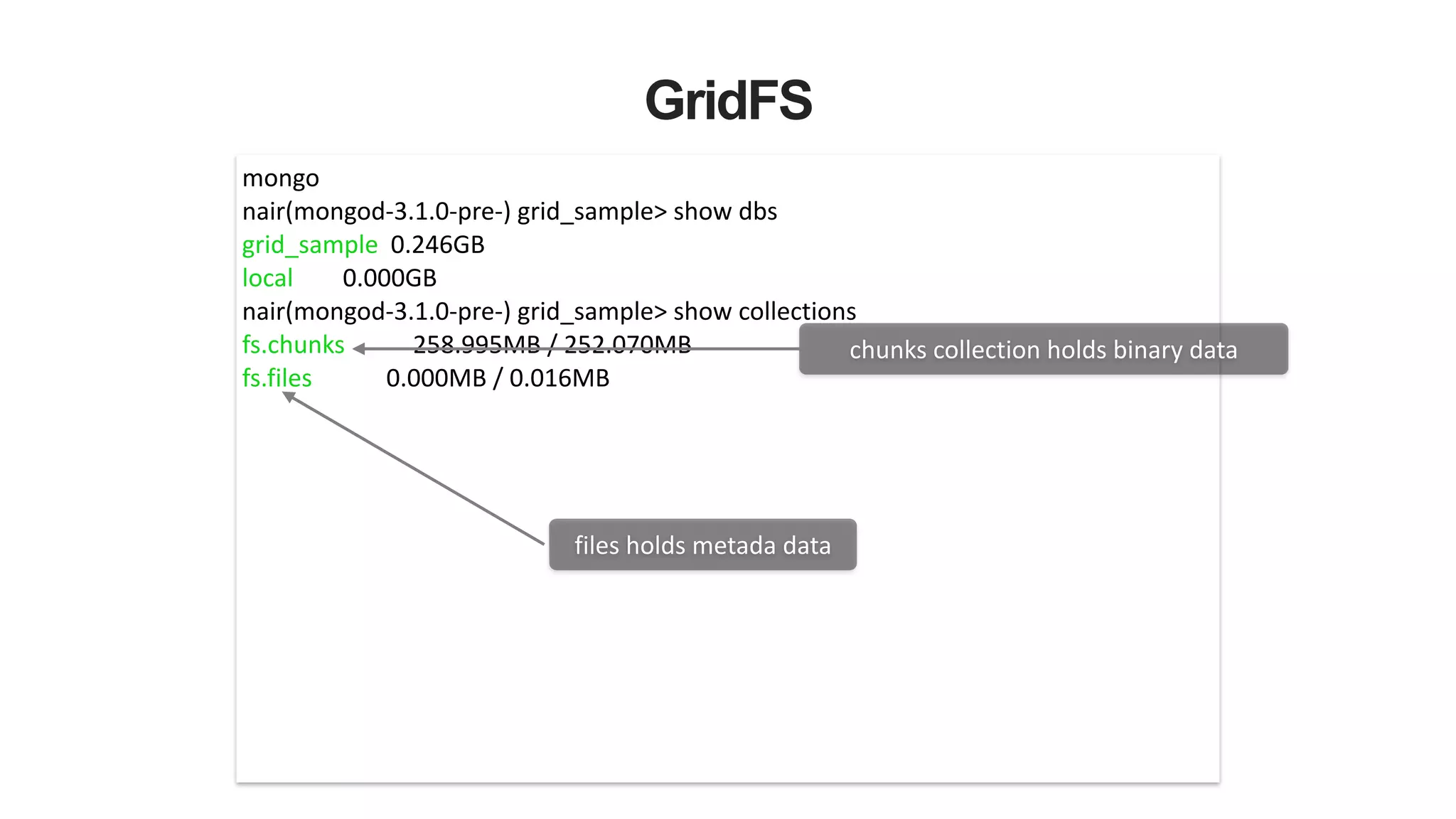
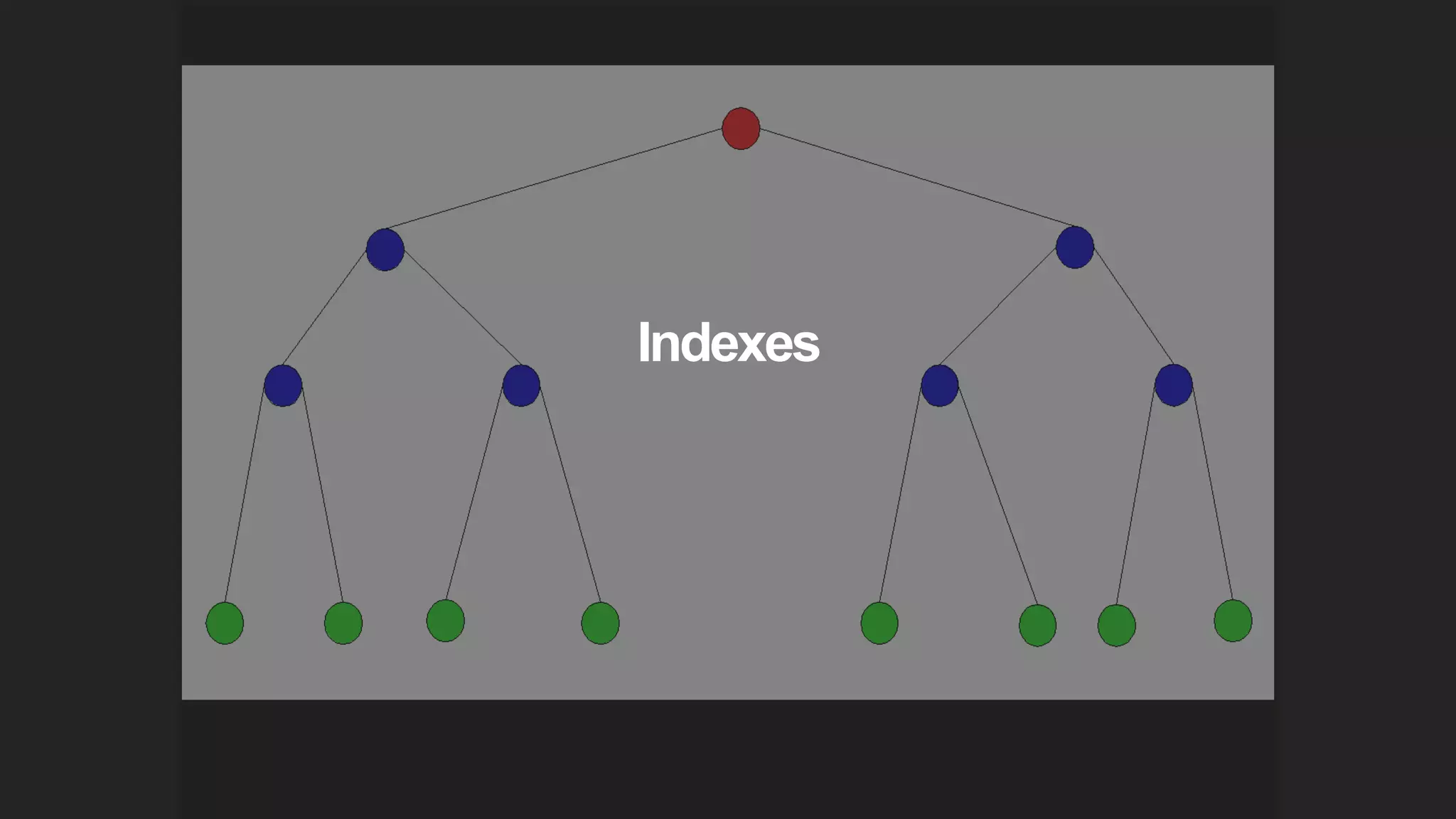
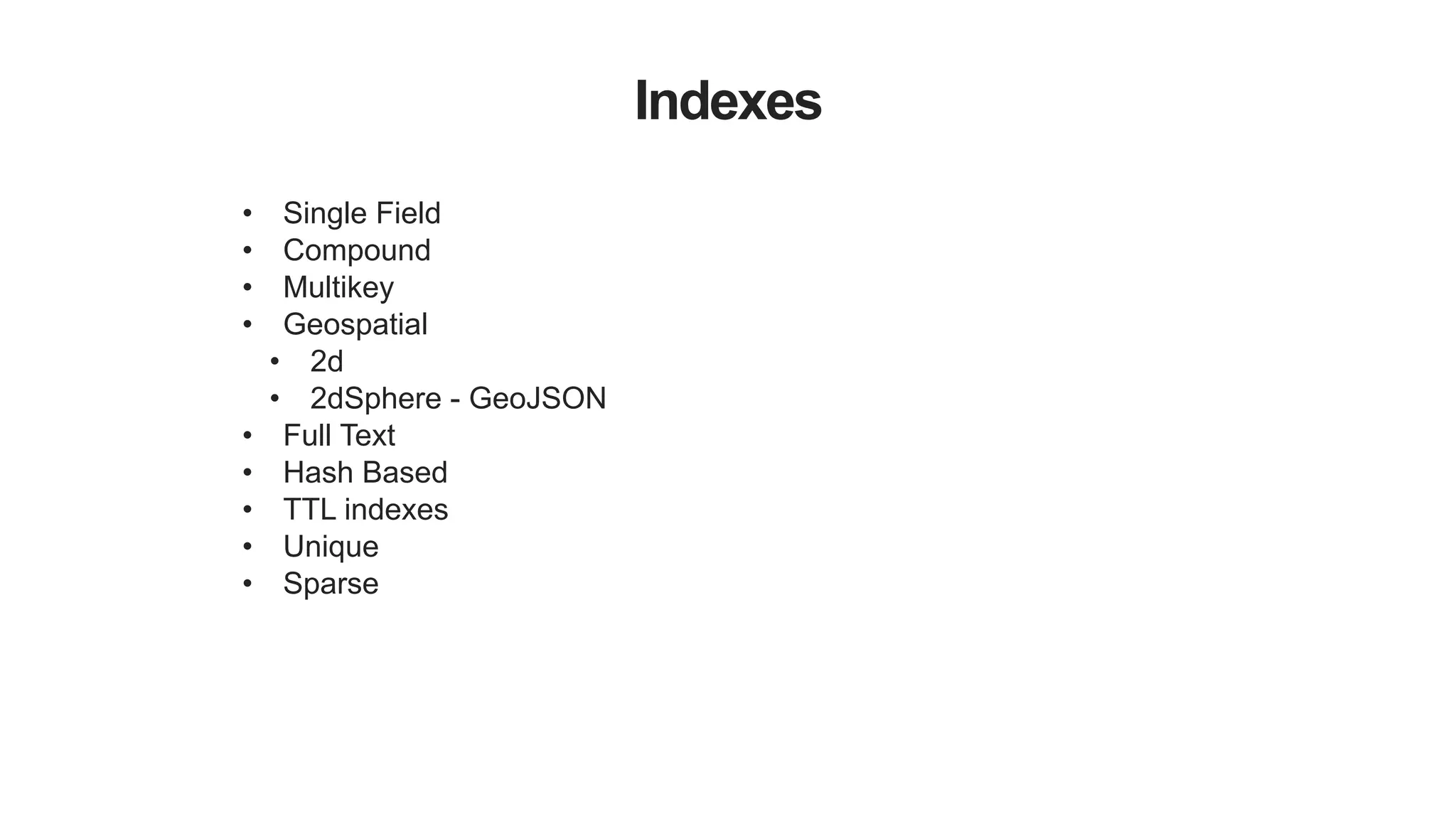
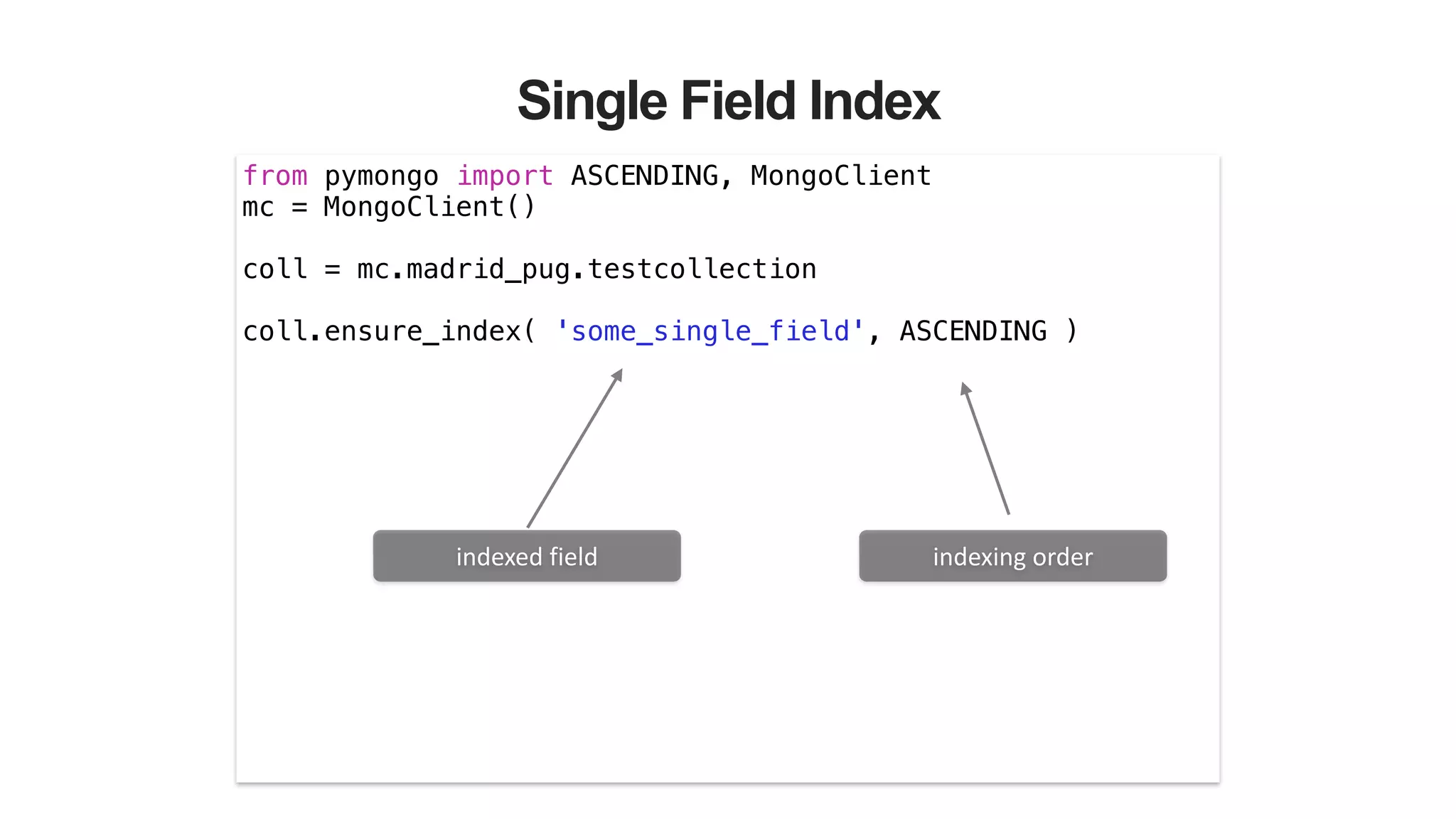
![Compound Field Index
from pymongo import ASCENDING, DESCENDING, MongoClient
mc = MongoClient()
!
coll = mc.madrid_pug.testcollection
!
coll.ensure_index( [('field_ascending', ASCENDING),
('field_descending', DESCENDING)] )
indexed
fields indexing
order](https://image.slidesharecdn.com/madridpug-150709181856-lva1-app6892/75/Python-and-MongoDB-44-2048.jpg)
![Multikey Field Index
mc = MongoClient()
!
coll = mc.madrid_pug.testcollection
!
!
coll.insert( {'array_field': [1, 2, 54, 89]})
!
coll.ensure_index( 'array_field')
indexed
field](https://image.slidesharecdn.com/madridpug-150709181856-lva1-app6892/75/Python-and-MongoDB-45-2048.jpg)
![Geospatial Field Index
from pymongo import GEOSPHERE
import geojson
!
!
p = geojson.Point( [-73.9858603477478, 40.75929362758241])
!
coll.insert( {'point', p)
!
coll.ensure_index( [( 'point', GEOSPHERE )])
index
type](https://image.slidesharecdn.com/madridpug-150709181856-lva1-app6892/75/Python-and-MongoDB-46-2048.jpg)



